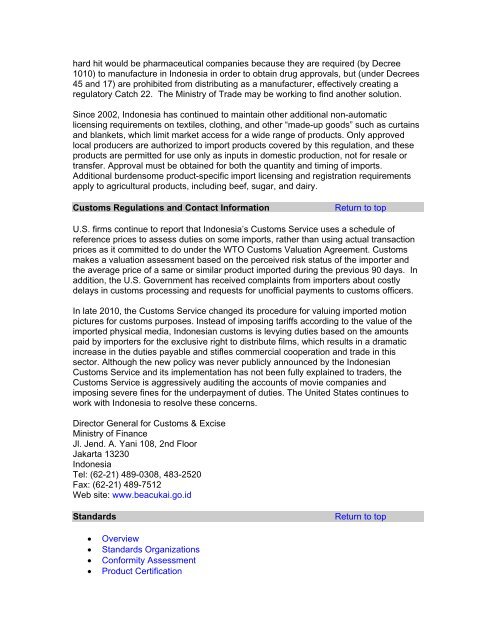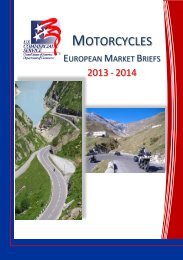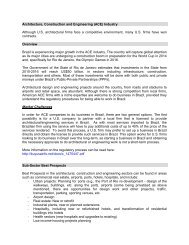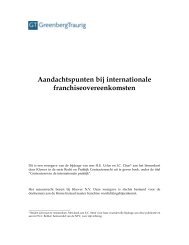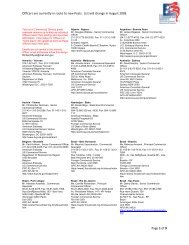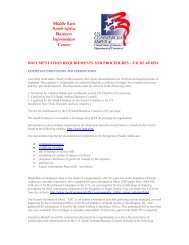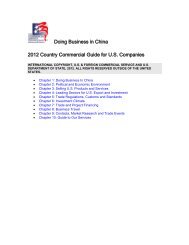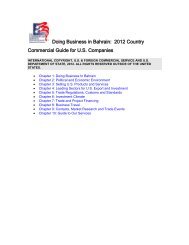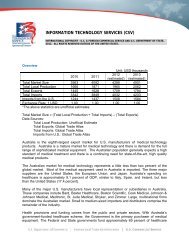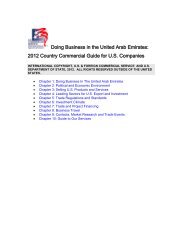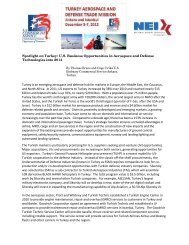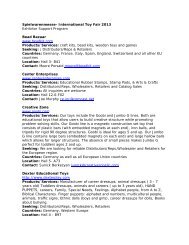Doing Business In Indonesia: 2012 Country - Export.gov
Doing Business In Indonesia: 2012 Country - Export.gov
Doing Business In Indonesia: 2012 Country - Export.gov
- TAGS
- export.gov
You also want an ePaper? Increase the reach of your titles
YUMPU automatically turns print PDFs into web optimized ePapers that Google loves.
hard hit would be pharmaceutical companies because they are required (by Decree<br />
1010) to manufacture in <strong>In</strong>donesia in order to obtain drug approvals, but (under Decrees<br />
45 and 17) are prohibited from distributing as a manufacturer, effectively creating a<br />
regulatory Catch 22. The Ministry of Trade may be working to find another solution.<br />
Since 2002, <strong>In</strong>donesia has continued to maintain other additional non-automatic<br />
licensing requirements on textiles, clothing, and other “made-up goods” such as curtains<br />
and blankets, which limit market access for a wide range of products. Only approved<br />
local producers are authorized to import products covered by this regulation, and these<br />
products are permitted for use only as inputs in domestic production, not for resale or<br />
transfer. Approval must be obtained for both the quantity and timing of imports.<br />
Additional burdensome product-specific import licensing and registration requirements<br />
apply to agricultural products, including beef, sugar, and dairy.<br />
Customs Regulations and Contact <strong>In</strong>formation Return to top<br />
U.S. firms continue to report that <strong>In</strong>donesia’s Customs Service uses a schedule of<br />
reference prices to assess duties on some imports, rather than using actual transaction<br />
prices as it committed to do under the WTO Customs Valuation Agreement. Customs<br />
makes a valuation assessment based on the perceived risk status of the importer and<br />
the average price of a same or similar product imported during the previous 90 days. <strong>In</strong><br />
addition, the U.S. Government has received complaints from importers about costly<br />
delays in customs processing and requests for unofficial payments to customs officers.<br />
<strong>In</strong> late 2010, the Customs Service changed its procedure for valuing imported motion<br />
pictures for customs purposes. <strong>In</strong>stead of imposing tariffs according to the value of the<br />
imported physical media, <strong>In</strong>donesian customs is levying duties based on the amounts<br />
paid by importers for the exclusive right to distribute films, which results in a dramatic<br />
increase in the duties payable and stifles commercial cooperation and trade in this<br />
sector. Although the new policy was never publicly announced by the <strong>In</strong>donesian<br />
Customs Service and its implementation has not been fully explained to traders, the<br />
Customs Service is aggressively auditing the accounts of movie companies and<br />
imposing severe fines for the underpayment of duties. The United States continues to<br />
work with <strong>In</strong>donesia to resolve these concerns.<br />
Director General for Customs & Excise<br />
Ministry of Finance<br />
Jl. Jend. A. Yani 108, 2nd Floor<br />
Jakarta 13230<br />
<strong>In</strong>donesia<br />
Tel: (62-21) 489-0308, 483-2520<br />
Fax: (62-21) 489-7512<br />
Web site: www.beacukai.go.id<br />
Standards Return to top<br />
• Overview<br />
• Standards Organizations<br />
• Conformity Assessment<br />
• Product Certification


